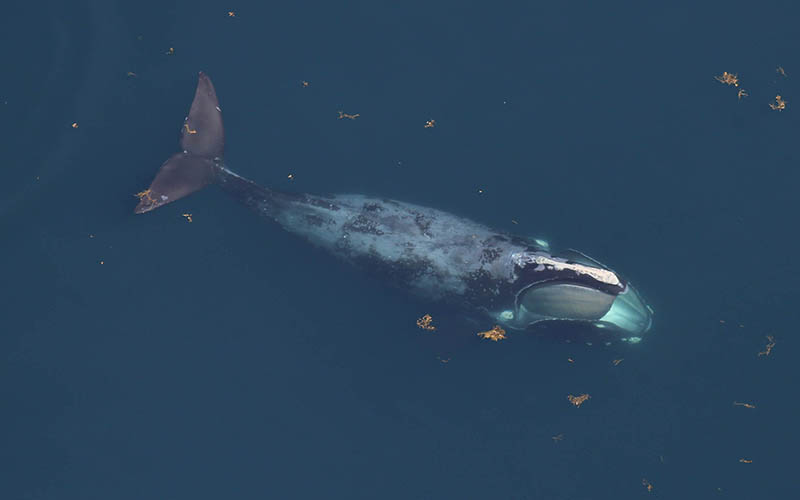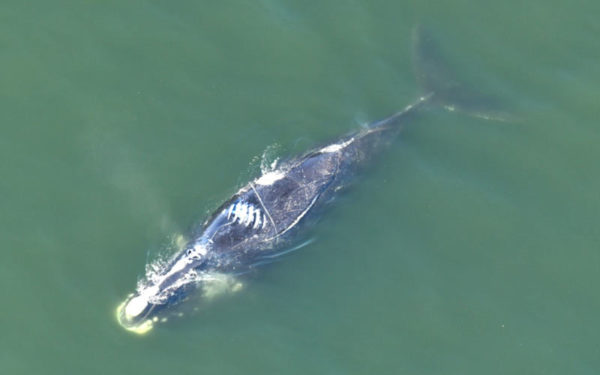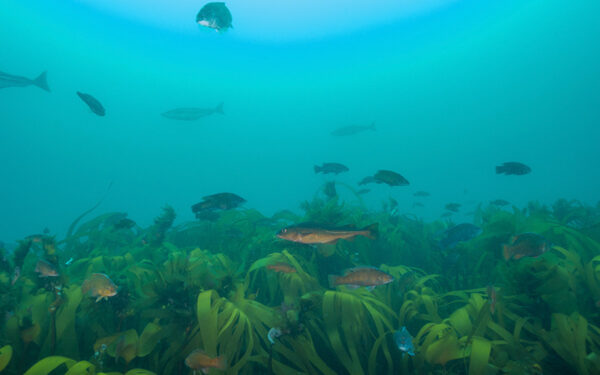
After a victory in the first phase of our lawsuit to protect endangered North Atlantic right whales, we're asking the court for protective measures in the second phase. Photo: NOAA Fisheries, Northeast Fisheries Science Center
UPDATE: The federal government must implement new rules to protect endangered North Atlantic right whales from entanglement in dangerous lobster fishing lines by May 31, 2021 after a federal judge ruled on the second phase of our lawsuit. This second ruling follows the judge’s April decision that determined the National Marine Fisheries Service violated the Endangered Species Act when it allowed the American lobster fishery to operate without the legally required permit that appropriately analyzed the fishery’s impact on right whales.
CLF has been fighting in court for endangered North Atlantic right whales for decades. With a population of barely 400 animals, the species is one of the most critically imperiled large whales on the planet. The death of just one female is devastating to the species’ recovery.
After a slew of deaths in 2017, we went to court to hold the federal government accountable for its failure to protect right whales from entanglements in lobster fishing gear. This fishery is not the only threat to right whales, but it’s an important one. The heavy lines connecting buoys to traps on the ocean floor can wrap around whales or get caught in their baleen, causing painful injuries and death. We argued that federal fishery managers violated both the Endangered Species Act (ESA) and the Marine Mammal Protection Act (MMPA) because of this threat.
In April, a federal judge agreed with CLF and our co-plaintiffs. Allowing the lobster fishery to operate without securing the required permit – despite admitting the fishery could kill more than three whales a year – was, as the judge wrote, “about as straightforward a violation of the Endangered Species Act as they come.”
This is a victory for right whales, but it’s not the end of this lawsuit. The next step is to ask the court for two measures that will hold the government’s feet to the fire. First, order enforceable deadlines to complete the plan to reduce the number of dangerous vertical lines in the water. Second, prohibit lobster fishing in a portion of southern New England, where right whales feed and socialize in large numbers, until the long-term plan is effective on the water.
A win for right whales and other endangered species
These majestic creatures migrate along the East Coast from their winter calving grounds in Florida and Georgia to summer feeding grounds. This migration, close to shore, has always been risky due to ship strikes and entanglements in the vertical fishing lines.
Recently it’s gotten riskier. Climate change effects have shifted their summer food source from the Gulf of Maine into colder Canadian waters. This forces the whales to swim farther only to reach an area full of commercial shipping traffic and fishing grounds rife with heavy, dangerous ropes.
The Endangered Species Act requires the agency to demonstrate that the ongoing operation of the lobster fishery will not harm or “take” (a legal term encompassing killing, harassing, and capturing) right whales and that it is appropriately permitted for the take that does occur.
The MMPA similarly prohibits “taking” marine mammals such as right whales, but it has an exception for commercial fisheries that meet certain conditions and are appropriately permitted. For these fisheries, the federal government must prove that the activity won’t have more than a negligible impact on the species’ recovery. That’s a tough standard as even a single right whale death can threaten the species’ survival.
When federal fishery managers recognized that the lobster fishery couldn’t meet these standards as it currently operates, it skipped the required permitting process and simply allowed the fishery to operate. That’s illegal.
What’s next: protected waters and long-term solutions
Here’s what we’re asking the court to do now:
1. Order the government to comply with specific, enforceable deadlines to complete its plan to reduce entanglement risk by 60 percent. Federal managers continue to postpone updates to a long-term plan to reduce the risk of entanglements in New England. This planning process has been moving forward in tandem to our lawsuit, and the proposed rule is long overdue.
Federal managers are also working on an updated analysis, called a “biological opinion,” which incorporates the best available science on this declining population and takes into account the sub-lethal effects of chronic entanglements. Like the proposed rule, this analysis is also long overdue.
Setting enforceable deadlines for the completion of these critical processes will allow us to hold the federal government accountable for recovering this species.
2. Order the government to prohibit fishing with vertical lines in an area south of Nantucket and Martha’s Vineyard in the interim. We now know that right whales are found in this area year-round. In the late winter and early spring, much of the population feeds — with their mouths wide open — and breeds there, increasing their risk of entanglement.
The protected area we propose is adjacent to other areas seasonally closed to protect right whales. It will create a safe corridor as whales travel between southern New England and the Cape Cod Bay.
Whales and fisheries can co-exist, but adequate protections must be in place. Ropeless fishing, which eliminates the deadly vertical rope lines in the water, could be allowed under our proposal.
You can be part of the long-term solution
Later this summer, you’ll have the opportunity to submit public comments on the federal government’s proposed rule for long-term protections. Sign up for CLF emails so you can speak up for right whales.



